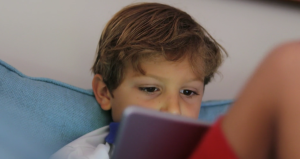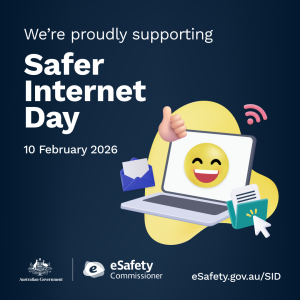Online Safety for Children and Young People at Hillsong Church

Safer Internet Day 2026

Online Safety
Information for Parents and Carers
Hillsong programs for children and young people seek to provide positive and safe physical and online environments for all participants.
It’s important to be aware of ways you can help your child to have safe and positive experiences online. Parents and carers should also understand the potential for negative online experiences including:
Online Communication and Personal Interaction
Hillsong Safe Church recommends transparent communication between leaders and young people, ensuring that communication is within appropriate boundaries.
Tips for Parents and Carers
✓ Find out who your child or young person’s leaders are.
✓ If you’re concerned about who is contacting your young person or what type of communication they’re receiving please contact safe church.
✓ Photos of children and young people should only be shared with parent/carer permission and on official church social media and websites. Photos and/or captions should not include the child or young person’s personal details such as full name, address, phone number, social media profile names, or the name of the school they attend. Sharing this information may pose a risk to their personal safety.
Contact Safe Church: [email protected] or 1800 557 264
Staying Safe Online
Helping your child or young person to be safe online Here are some resources and tips on helping your child or young person to be safe online, use the discussion points below to ‘start the chat’ about online safety. For more resources visit esafety.gov.au
Be Safe
✓ Talk with your child about the positive experiences they can have online connecting with friends.
✓ Remind them that not everyone online is nice and people can also pretend to be someone else.
✓ Teach your child that personal information is like the key to your house. When you’re online, information like your full name, date of birth, phone number and where you live is information you need to be careful with.
✓ Enable security and privacy settings on your child’s device and encourage them that privacy and security settings on devices and apps help to keep personal information, and them, safe.
✓ Tell your child that messages that make them feel uncomfortable, unsafe, scared or a bit weird are not right for them and they should let you know.
Be Kind
✓ Encourage your child to be kind to others and explain that being mean online is not ok.
✓ Help your child to understand that not everyone online is kind and if someone is being mean or makes them feel uncomfortable they should let you know.
Ask for Help
✓ Remind your child that it’s good to stay in an open area or nearby to you when they’re online so they can easily ask you for help if they need to.
✓ Tell your child that if they see something online that makes them feel uncomfortable or if someone sends them an image or video that makes them feel yuck they should let you know.
Make good choices
✓ Encourage your child to make good choices when online.
✓ Tell them that not everything is always as it seems. Some things online can trick us. It could be a fake news story, information that is not true or a fake website. Or someone could pretend to be another person online.
Help your children safely navigate their digital world and educate them to avoid harmful online experiences. Explore websites, games, apps and social media together and set some rules. Your support and guidance can give your children the confidence to make sound decisions online and ask for help when they need it. esafety.gov.au
More Tips for parents and Carers
✓ Be aware of your child or young person’s safety online. It can be helpful to reach a family agreement about rules on using the internet at home and encourage an open dialogue about online activity.
✓ Check device privacy settings and be mindful of geo-tagging and metadata. Consider installing software to block access to certain sites.
✓ Where possible, limit the use of devices in bedrooms.
✓ Be careful who you share sensitive information with online, such as address, date of birth or the school your children attend.
✓ Check out the resources for parents and carers at esafety.gov.au/parents
✓ Encourage young people to learn about online safety at esafety.gov.au/young-people
✓ Help children to learn about online safety at Kids esafety.gov.au/kids
To learn about the latest games, apps and social media, including how to protect your information and report inappropriate content, see the eSafety Commission’s eSafety Guide esafety.gov.au/key-issues/esafety-guide
Online Safety
Information for Children and Young People
Hillsong programs services should be safe and fun for everyone involved. You should be safe when you’re here in person as well as in online spaces.
Remember: If you don’t feel safe or something makes you feel uncomfortable tell your parents or your leaders or Safe Church. You can contact Safe Church anytime on [email protected] or 1800 557 264
Staying Safe Online
The online environment can be a great place to have fun, play games, connect with friends, learn and discover. Just like it’s important to stay safe in physical spaces, it’s important to stay safe in online spaces too.
Be Safe
✓ Being online can be lots of fun if you’re safe. There are some things you need to do so you can stay safe and have fun.
✓ Talk to people online that you know in person. Not everyone online is nice and people can also pretend to be someone else.
✓ Personal information is like the key to your house. When you’re online, information like your full name, date of birth, phone number and where you live is information you need to be careful with.
✓ Enable security and privacy settings on devices. Privacy and security settings on devices and apps help to keep personal information, and you, safe.
✓ Tell your parents or someone you trust if you’re sent any messages that make you feel uncomfortable. If a message makes you feel unsafe, scared or a bit weird then it’s not right for you. Don’t respond to them and let an adult you trust know about it.
Be Kind
✓ Be kind to others, being mean online is not ok.
✓ Remember no one deserves to be hurt online. It’s not your fault. You can get help.
✓ Let your parents or a trusted adult know if someone is being mean or makes you feel uncomfortable. Not everyone online is kind.
✓ You can help by watching out for others and making sure they are ok.
✓ Stand up for others if you see bullying online. Tell an adult what’s going on. Be kind to anyone who is being bullied. Show them you care by supporting and including them.
Ask for Help
✓ Stay in an open area or nearby to your parent, carer or trusted adult when you’re online so you can easily ask for help if you need to.
✓ Ask for help if you see something online that makes you feel uncomfortable or if someone sends you an image or video that makes you feel yuck.
✓ Ask for help if you need to block someone from sending you messages that make you feel unsafe. If someone you don’t know is contacting you or if someone is bullying you online it can be reported to the app or site you’re on. eSafety.gov.au can also help to get content removed.
✓ Switch off your device, close the browser or turn off the screen if you see something you don’t like. It’s not your fault if you see something you don’t like. Tell an adult and don’t worry about getting in trouble. It’s more important that you talk to your parents or an adult you trust so they can make sure you are ok and ensure you don’t see something like that again.
Make good choices
✓ Make good choices when you’re online.
✓ Be wise, not everything is always as it seems. Some things online can trick us. It could be a fake news story, information that is not true or a fake website. Or someone could pretend to be another person online.
✓ Make your accounts private and don’t accept requests from strangers.
✓ Remember once you share something online it is very difficult to take it back. It could be shared or copied by someone else.
✓ If you are unsure, don’t share it! There are plenty of things you can share online, but you need to keep your personal information private. If you are unsure about sharing something, it is best not to share it.
✓ Always ask an adult before downloading something, spending money, using gift cards online or entering competitions to win prizes. Watch out for sneaky online tricks to make you pay without knowing or online scams.
Learn more about staying safe online:
Kids esafety.gov.au/kids
Young People esafety.gov.au/young-people
If you need more help or support you can contact Kidshelpline 1800 55 1800 or Headspace (for 12-25y/o) 1800 65 0890